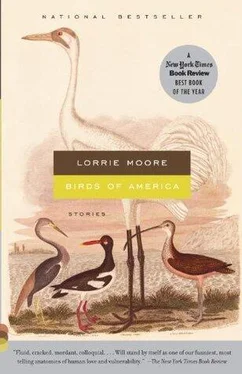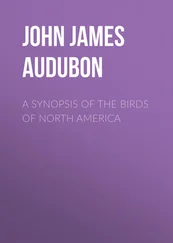“No?” She keeps going. She looks up at him romantically, yearningly. “ ‘When I take you out in my surrey, when I take you out in my surrey with the fringe on—’ ”
“No,” Andrew interrupts emphatically.
“Hmm. Well, don’t worry. Everyone on your team will know it.”
The righteous indignation is returning to his face. “If I don’t know it, what makes you think they’ll know it?” Perhaps this is because of his work, the technosecrecy of it. He knows; they don’t.
“They’ll know it,” Therese says. “I guarantee.” She turns to leave.
“Whoa, whoa, whoa,” says Andrew. The gray-pink of rage is back in his skin. What has he become? She hasn’t a clue. He is successfully top secret. He is classified information. “I’m not doing this,” he says. “I refuse.”
Therese stares at him. This is the assertiveness he can’t exercise on the job. Perhaps here, where he is no longer a cog-though-a-prized cog, he can insist on certain things. The Cold War is over, she wants to say. But what has replaced it is this: children who have turned on one another, now that the gods — or were they only guards? — have fled. “Okay, fine,” she says. “I’ll make up another.”
“We’re doing another one,” announces Andrew triumphantly as they go back into the living room. He waves the paper scrap. “Have any of you ever even heard of a song called ‘The Surrey with the Fringe on Top’?”
“Sure,” says Pam, looking at him in a puzzled way. No doubt he seems different to her around the holidays.
“You have?” He seems a bit flummoxed. He looks at Ann. “Have you?”
Ann looks reluctant to break ranks with him but says, quietly, “Yeah.”
“Tad, how about you?” he asks.
Tad has been napping off and on, his head thrown back against the sofa, but now he jerks awake. “Uh, yeah,” he says.
“Tad’s not feeling that well,” says Ann.
In desperation, Andrew turns toward the other team. “And you all know it, too?”
“I don’t know it,” says Ray. He is the only one. He doesn’t know a show tune from a chauffeur. In a way, that’s what Therese likes about him.
Andrew sits back down, refusing to admit defeat. “Ray didn’t know it,” he says.
Therese can’t think of a song, so she writes “Clarence Thomas” and hands the slip back to Andrew. As he ponders his options, Therese’s mother gets up and comes back holding Dixie cups and a bottle of cranberry drink. “Who would like some cranberry juice?” she says, and starts pouring. She hands the cups out carefully to everyone. “We don’t have the wineglasses unpacked, so we’ll have to make do.”
“We’ll have to make do” is one of their mother’s favorite expressions, acquired during the Depression and made indelible during the war. When they were little, Therese and Andrew used to look at each other and say, “We’ll have to make do-do,” but when Therese glances over at Andrew now, nothing registers. He has forgotten. He is thinking only of the charade.
Ray sips his a little sloppily, and a drop spills on the chair. Therese hands him a napkin and he dabs at the upholstery with it, but it is Ann who is swiftly up, out to the kitchen, and back with a cold, wet cloth, wiping at Ray’s chair in a kind of rebuke.
“Oh, don’t worry,” her mother is saying.
“I think I’ve got it,” says Ann solemnly.
“I’m doing my clues now,” says Andrew impatiently. Therese looks over at Winnie, who, calm and observant in her mother’s arms, a pink incontinent Buddha who knows all her letters, seems like the sanest person in the room.
Andrew is making a sweeping gesture with his arm, something meant to include everyone in the room.
“People,” says Tad.
“Family,” says Pam.
Ann has come back from the kitchen and sits down on the sofa. “Us,” she says.
Andrew smiles and nods.
“Us. Thom-us,” says Ann. “Clarence Thomas.”
“Yes,” says Andrew with a clap. “What was the time on that?”
“Thirty seconds,” says Tad.
“Well, I guess he’s on the tip of everyone’s tongue,” says Therese’s mother.
“I guess so,” says Therese.
“It was interesting to see all those black people from Yale,” says Therese’s mother. “All sitting there in the Senate caucus room. I’ll bet their parents were proud.”
Ann did not get in to Yale. “What I don’t like,” she says, “is all these black people who don’t like whites. They’re so hostile. I see it all the time in law school. Most white people are more than willing to sit down, be friendly and integrated. But it’s the blacks who are too angry.”
“Imagine that,” says Ray.
“Yes. Imagine,” says Therese. “Why would they be angry? You know what else I don’t like? I don’t like all these gay men who have gotten just a little too somber and butch. You know what I mean? They’re so funereal and upset these days! Where is the mincing and high-spiritedness of yesteryear? Where is the gayness in gay ? It’s all so confusing and inconvenient! You can’t tell who’s who without a goddamn Playbill !” She stands up and looks at Ray. It is time to go. She has lost her judicial temperament hours ago. She fears she is going to do another pratfall, only this time she will break something. Already she sees herself carted out on a stretcher, taken toward the airport, and toward home, saying the final words she has to say to her family, has always had to say to her family. Sounds like could cry .
“Good-bye!”
“Good-bye!”
“Good-bye!”
“Good-bye!”
“Good-bye!”
“Good-bye!”
“Good-bye!”
But first Ray must do his charade, which is Confucius. “Okay. I’m ready,” he says, and begins to wander around the living room in a wild-eyed daze, looking as confused as possible, groping at the bookcases, placing his palm to his brow. And in that moment, Therese thinks how good-looking he is and how kind and strong and how she loves nobody else in the world even half as much.
FOUR CALLING BIRDS, THREE FRENCH HENS
When the cat died on Veterans Day, his ashes then packed into a cheesy pink-posied tin and placed high upon the mantel, the house seemed lonely and Aileen began to drink. She had lost all her ties to the animal world. She existed now in a solely man-made place: the couch was furless, the carpet dry and unmauled, the kitchen corner where the food dish had been no longer scabby with Mackerel Platter and hazardous for walking.
Oh, Bert!
He had been a beautiful cat.
Her friends interpreted the duration and intensity of her sorrow as a sign of displaced mourning: her grief was for something larger, more appropriate — it was the impending death of her parents; it was the son she and Jack had never had (though wasn’t three-year-old Sofie cute as a zipper?); it was this whole Bosnia, Cambodia, Somalia, Dinkins, Giuliani, NAFTA thing.
No, really, it was just Bert, Aileen insisted. It was just her sweet, handsome cat, her buddy of ten years. She had been with him longer than she had with either Jack or Sofie or half her friends, and he was such a smart, funny guy — big and loyal and verbal as a dog.
“What do you mean, verbal as a dog ?” Jack scowled.
“I swear it,” she said.
“Get a grip,” said Jack, eyeing her glass of blended malt. Puccini’s “Humming Chorus,” the Brahms “Alto Rhapsody,” and Samuel Barber’s Adagio for Strings all murmured in succession from the stereo. He flicked it off. “You’ve got a daughter. There are holidays ahead. That damn cat wouldn’t have shed one tear over you.”
“I really don’t think that’s true,” she said a little wildly, perhaps with too much fire and malt in her voice. She now spoke that way sometimes, insisted on things, ventured out on a limb, lived dangerously. She had already — carefully, obediently — stepped through all the stages of bereavement: anger, denial, bargaining, Häagen-Dazs, rage. Anger to rage — who said she wasn’t making progress? She made a fist but hid it. She got headaches, mostly prickly ones, but sometimes the zigzag of a migraine made its way into her skull and sat like a cheap, crazy tie in her eye.
Читать дальше












